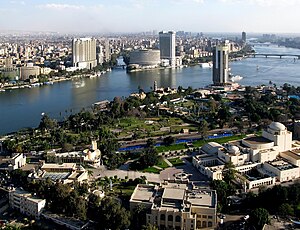 Image via WikipediaAs of today Eastern and some of the West coast of Libya appears to have freed themselves from the vice grip of Qaddafi’s regime. This situation highlights the problem of the economics of class and hierarchy. When an economy is structured to create a gap between the ‘haves’ and the ‘have nots’ it is, by its own nature, unstable. When that gap is allowed to widen, the situation becomes a powder keg needing only a spark to ignite it.
Image via WikipediaAs of today Eastern and some of the West coast of Libya appears to have freed themselves from the vice grip of Qaddafi’s regime. This situation highlights the problem of the economics of class and hierarchy. When an economy is structured to create a gap between the ‘haves’ and the ‘have nots’ it is, by its own nature, unstable. When that gap is allowed to widen, the situation becomes a powder keg needing only a spark to ignite it.Sunday, February 27, 2011
Contagion Libya
 Image via WikipediaAs of today Eastern and some of the West coast of Libya appears to have freed themselves from the vice grip of Qaddafi’s regime. This situation highlights the problem of the economics of class and hierarchy. When an economy is structured to create a gap between the ‘haves’ and the ‘have nots’ it is, by its own nature, unstable. When that gap is allowed to widen, the situation becomes a powder keg needing only a spark to ignite it.
Image via WikipediaAs of today Eastern and some of the West coast of Libya appears to have freed themselves from the vice grip of Qaddafi’s regime. This situation highlights the problem of the economics of class and hierarchy. When an economy is structured to create a gap between the ‘haves’ and the ‘have nots’ it is, by its own nature, unstable. When that gap is allowed to widen, the situation becomes a powder keg needing only a spark to ignite it.
Labels:
Africa,
Business models,
Eastern Europe,
Egypt,
former Soviet Union,
freedom,
Libya,
Middle East,
Muammar al-Gaddafi,
Qaddafi,
Tripoli,
United Nations
Thursday, February 24, 2011
Labor Flux
The global economy is moving, more rapidly than most of us could have imagined 10 or 20 years ago, towards a true competitive advantage model. But these falling barriers to labor flows create other dislocations. Even at first glance, it is clear that labor as an input to production has radically different characteristics than natural resources. We typically think of the issues of structural rigidity because of individuals attachment to their countries and families, as well as, language barriers. In this post EU environment, barriers to labor flows have been rapidly declining, but there have been significant social costs to these freedoms.
Labels:
Barriers to entry,
China,
Labour economics,
United States
Saturday, February 19, 2011
China Eyes Egypt
This week's Economist has an excellent article on China's response to the events in Egypt. There is no doubt that China will have some critical choices to make in the next couple of years. Given the changes in the country since Tiananmen Square, it is difficult to imagine that less social and political liberty will be a viable option. The question remains whether or not the Politburo will manage to shift its priority from pure economic growth to a more balanced agenda. There is no doubt that establishing a strong economic base is critical to having an orderly transition to social and political freedoms, but where is the tipping point? At what point will the marginal returns to economic growth no longer contain the rising impulse for freedom?
http://www.economist.com/node/18178177
http://www.economist.com/node/18178177
Monday, February 14, 2011
Change is Gonna Come
 Image via WikipediaOver the last few weeks, I have been watching events in Egypt unfold with optimism and hope. Although it has been over twenty years since my last visit to Cairo, I have such fond memories of the people and their extraordinary hospitality. This country seems to be an excellent environment in which to develop a new prototype for balanced economic, political and social reform.
Image via WikipediaOver the last few weeks, I have been watching events in Egypt unfold with optimism and hope. Although it has been over twenty years since my last visit to Cairo, I have such fond memories of the people and their extraordinary hospitality. This country seems to be an excellent environment in which to develop a new prototype for balanced economic, political and social reform.Conventional wisdom tells us that social and political democracy is not necessarily a strong first step to the opening and democratization of markets. We have the case of Russia as a relatively current example of the challenges of managing market expansion in a burgeoning democracy. Similarly, many would argue that the market reforms in China have been successful although political and social reform has happened at a much slower pace.
Labels:
Democracy,
Economics,
Egypt,
India,
market economy,
Middle East
Subscribe to:
Comments (Atom)